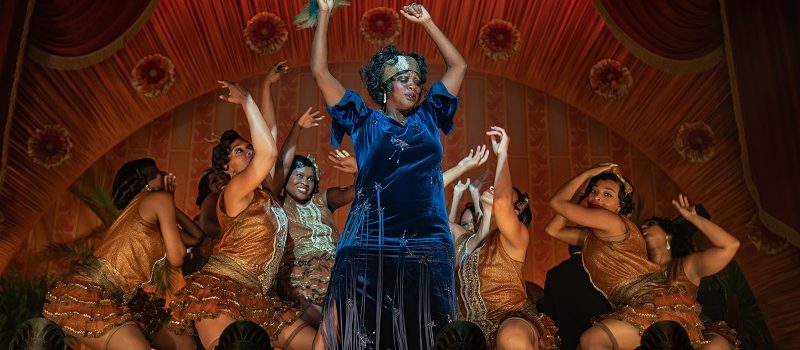The final note on the screen for Chadwick Boseman was achieved in the most enduring ways with his turn as trumpet player Levee in Ma Rainey’s Black Bottom. The stage play by August Wilson (Fences) comes to life on Netflix. Directed by George C. Wolfe, the cinematic Ma Rainey’s Black Bottom finds Viola Davis delivering a hurricane of a performance as the title character.
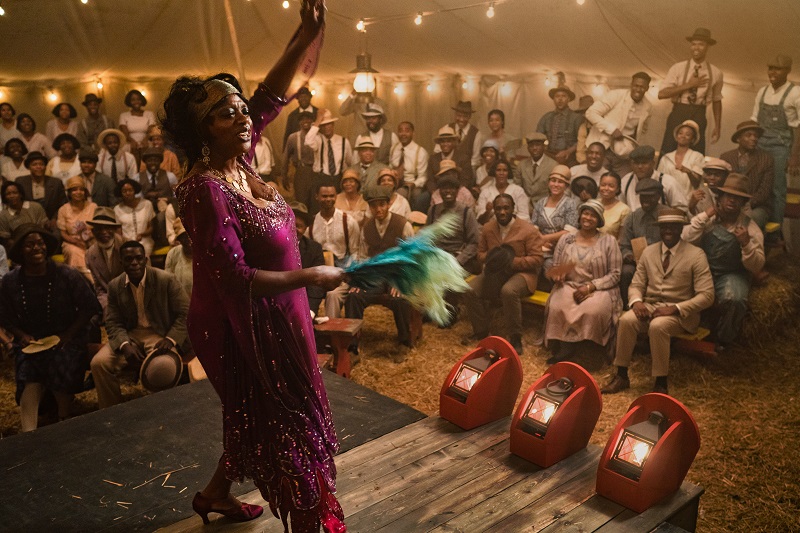
But this is definitively Boseman’s movie, there is no question. If Davis delivers those gale force winds as the 20s blues singer, Boseman is an earthquake spawning a tsunami of emotions that run the entire human gamut. There are several scenes where one might find themselves tearing up during those firestorm explosions of Boseman’s. His genius is so transcendent that its mere existence is a poignant experience. His trumpet titan Levee is high on himself, sure, but rightfully so given what is witnessed early in the film where Ma Rainey is performing with her band to packed houses in the south.
The crux of the story centers around a Chicago recording session in 1927 that gets tenacious, to put it mildly. Ma and Levee clash over musical arrangements and the so-called “Mother of the Blues” has no time for the horn player who seems to believe he deserves the spotlight as much as the woman whose moniker adorns the band.
Even though they still manage to capture sonic succulence, there is a myriad of inter-character complications that are so purely theatrical, the stage play truly does comes alive with Wolfe’s direction. One can feel the play through the film. That’s a feat.
Between those recording sessions, a majority of the narrative moving conversations exist in the rehearsal room and getting ready to record. The dialogue that ensues from the screenplay adaptation from Ruben Santiago-Hudson is as thick as southern molasses. Ma Rainey’s Black Bottom is a testament to rich conversation. It is mesmerizing to witness it delivered by an ensemble that inhabits this world as these souls would have been in the late 20s.
If you’ve seen Fences, then you know what I mean.
Wilson is a wizard of words, crafting the swirling verbiage with a command that few have possessed in history. It felt like such an honor to be overcome by his prose and to bask in his innate ability to take his audience on a journey of black Americans whose road was littered with obstacles, discrimination, violence, and a system set in place for hundreds of years that solely exists to hold them down. That aspect is especially true in Ma Rainey’s Black Bottom. Although we are lifted immensely by the bodacious blues that Ma and the band perform, it is inescapable to see why that particular genre of music resonates so pitch-perfectly with that population.
As laid out in Wilson’s play, and impeccably captured by Santiago-Hudson in his script and brought to life by director Wolfe, the reality of the day for African Americans is framed by the opening sequence and what is not-so-innocently shown and said throughout. Even something as simple as fulfilling Ma’s request for a Coca-Cola isn’t a task free from trouble. Yes, this is the “North” and a big metropolitan city. But if looks could kill, when two black men walk into a pharmacy seeking a refreshing beverage for their boss, those dudes would be done. 1927 America was still decades away from Martin Luther King, Jr. inspiring and Rosa Parks refusing to move.
That aspect permeates but never dominates. There is a subtly to what Wilson says through his characters. Ma Rainey is also a searing portrait of black art and how whites sought and continue to seek to exploit it. Levee has dreams of recording music that he wrote with his own band. He tells anyone who will listen that is the ultimate goal and that backing up Ma is merely a steppingstone. As soon as the trumpeter (and aspiring composer) tells his bandmates in that rehearsal room that the owner of the recording studio has seen his compositions and wants to record them, that worry creeps into the back of your head.
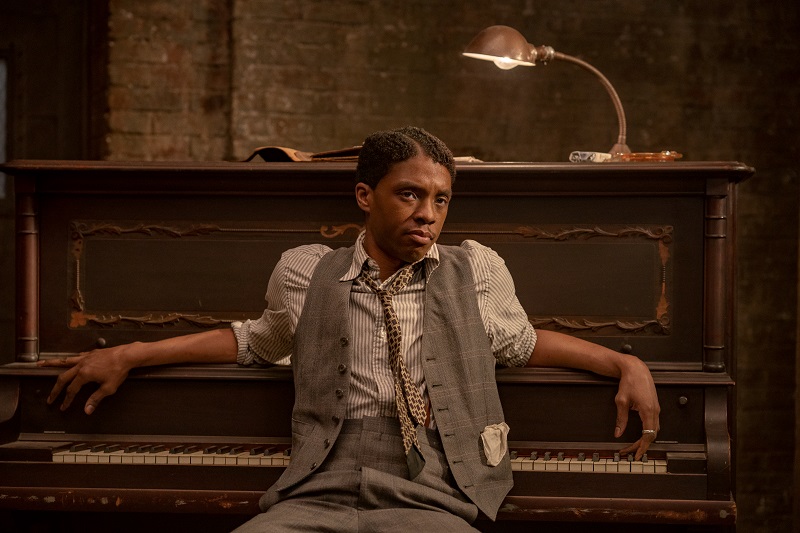
As shown in the trailer, Mr. Sturdyvant (Jonny Coyne) offers to “take them off his hands” because they are not good enough to record. We keenly know that’s code. Eminem even rapped about it when he said, “Though I’m not the first king of controversy. I am the worst thing since Elvis Presley to do black music so selfishly and use it to get myself wealthy.” Hey, at least he admitted it.
Trying to keep the peace and make sure the band stays a coherent unit is Colman Domingo’s Cutler. He’s much more than a trombone player. He’s Ma’s confidant, someone she can talk to who understands the pressures that she is under. Cutler has a knack for whipping the band into shape when there is an issue. Usually, it involves Levee. He knows he’s a talent in search of a spotlight, but Cutler keeps reminding him as long as he plays in Ma’s band, it’s about Ma and nothing else. That is particularly true in this recording session. These songs they record will be hits and all Cutler has to do to get paid is to ensure that everyone hits their notes when the time comes.
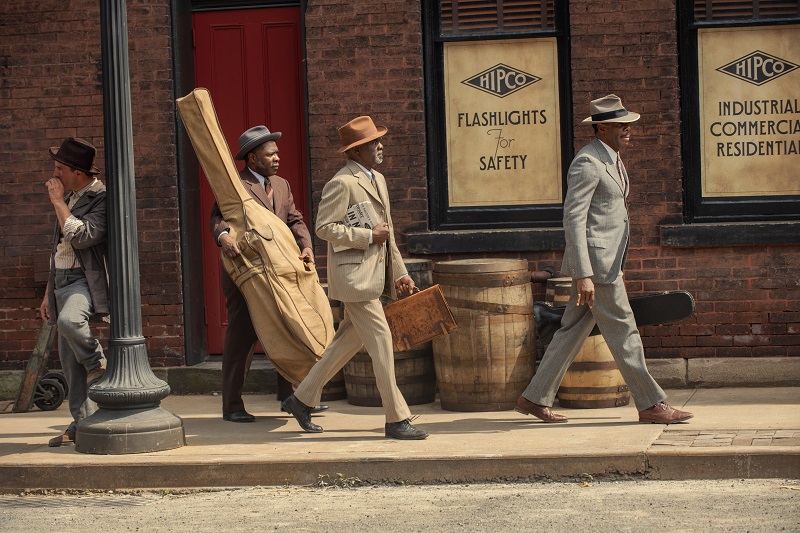
Domingo is joined in the band by piano man extraordinaire Toledo (Glynn Turman), and one badass bass player, Slow Drag (Michael Potts). All three veteran players are firmly products of their era and each is given the priceless opportunity to spin their own web via some sensational storytelling—as only Wilson could pen. They each share a common thread. Their backgrounds and birthplaces may be different, but their shared experience aging in America as a black man is in concert.
All four actors are spectacular. When the time arrives for their various monologues, for lack of a better descriptor, each delivers the most uniquely of moving moments. It is such blissful joy simply sitting back and letting Wilson’s wizardry wash over you. That is something almost expected by Davis and Boseman given their penchant for awesomeness. But this is an equal opportunity endeavor where everyone who populates Wilson’s world is distinctive in their own right. In the hands of these veteran actors, it is heavenly.
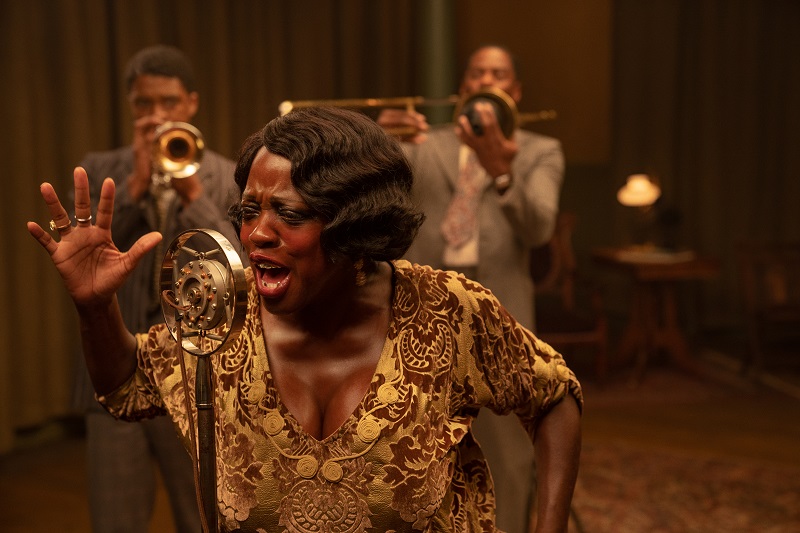
Davis is almost unrecognizable, overtly, as Ma and she inhabits the blues matriarch (who is a real-life singer from that era) as possessing a level of confidence that throws off whites… and she doesn’t care. She has supreme talent and even refers to those recording her on this fateful day as people who don’t care about her. “They just want my voice.” She’s not wrong. Davis, a veteran of the stage to screen Wilson adaptations—what with her Oscar-winning turn in Fences—gives us a Ma who was truly ahead of her time. Her band isn’t afraid of Ma, but they know their place… all except Levee.
Witnessing how Ma interacts with her agent (Jeremy Shamos’ Irvin) who aides in the recording session, also speaks volumes to the singer’s ego—one that we know is earned, judging by the opening of the movie performances. In the hands of Davis, it is a character who simultaneously is a product of her time, but also envisions a future that is yet to be considered by the masses. The actress continues to surprise—even though at this point we should just anoint her as one of the most gifted thespians that exist. Her turn as the titular character in Ma Rainey’s Black Bottom is nothing short of a movie miracle.
The title of the movie—and a song she records during this session—is brilliantly illustrated as embodying Ma when she actually expresses what she is planning to do if things don’t go her way. “I’m going to take my black bottom and…”
Boseman… what can be said?
He’s a gift to us all. He burned so brightly during the time we had with him. Ma Rainey’s Black Bottom is a fitting Coda to his career that included turns as Thurgood Marshall, Jackie Robinson, T’Challa, and James Brown. Given those real-life black heroes and one fictional superhero, to have the curtain close with him personifying Wilson’s Levee is an embodiment of the sentiment about leaving them wanting more. It’s true. After seeing what he delivers as Levee, I was sobbing when the credits rolled.
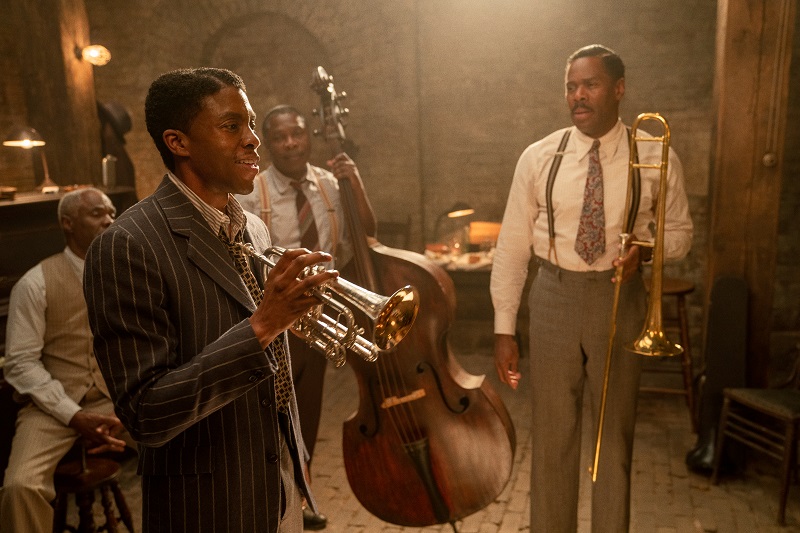
It was an earned teary rainstorm from that particular character and his fateful finish, but also knowing that it would be the last time that Chadwick Boseman would move me through his titanic thespian talents. How Levee’s story concludes, makes one think about someone like Boseman and if he was born in 1900. He could have been a Levee.
The film’s conclusion, therefore, becomes like a punch to the gut, especially that final shot.
Grade: A

